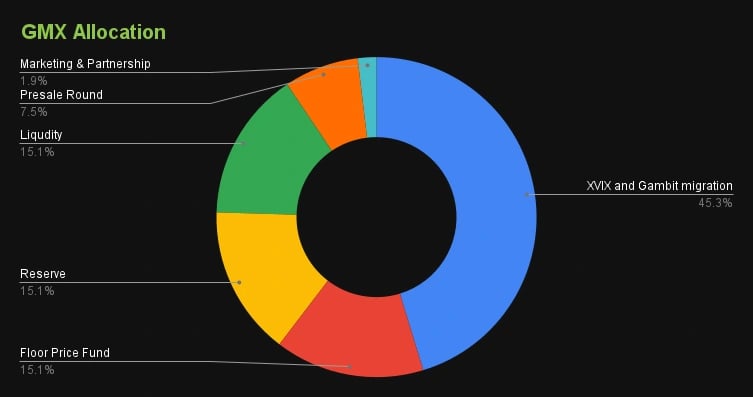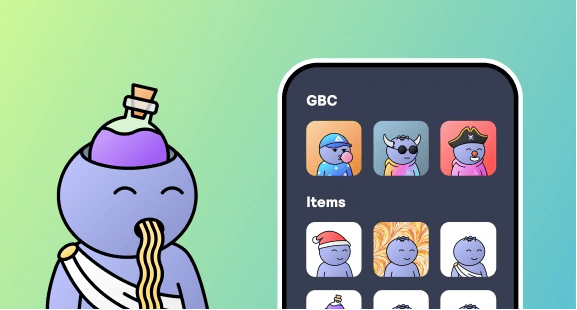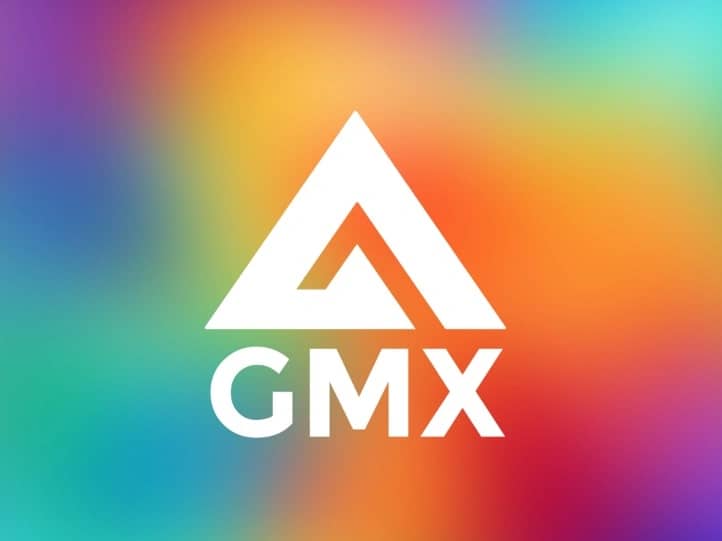위키 구독하기
Share wiki
Bookmark
GMX
0%
GMX
GMX는 영구 선물 거래에 중점을 둔 것으로 가장 잘 알려진 탈중앙화 거래소입니다. 2021년 말 이더리움 레이어 2 네트워크 Arbitrum에서 출시되었으며 이후 Avalanche에 배포되었습니다. 이 플랫폼은 예치된 담보의 최대 30배까지 높은 레버리지 옵션으로 인해 인기를 얻었습니다. [1][7][8]
개요
GMX는 탈중앙화 거래 기능과 레버리지 거래 옵션을 모두 제공합니다. 이러한 조합은 Uniswap과 같은 DeFi 거래소의 기능과 Binance와 같은 거래소의 레버리지 제공을 결합한 것입니다. [7]
이 프로토콜은 최대 30배(알파에서는 50배)의 레버리지 거래, 가격 오라클 사용을 통한 청산 위험 감소, 최소 스프레드 및 주문에 대한 가격 영향 제로로 인한 비용 절감, 마진, 부채 및 담보의 복잡성 없는 사용자 친화적인 인터페이스, 저렴한 수수료 네트워크에서의 멀티체인 존재와 같은 몇 가지 주요 기능을 제공합니다. [9]
시장 가격은 주요 거래소에서 데이터를 수집하여 가격 피드를 형성하는 Chainlink 오라클에 의해 결정됩니다. 이는 단일 자동화된 마켓 메이커의 갑작스러운 변동으로 인한 투자 청산을 방지합니다. [17]
GMX는 표준 오라클에 비해 더 빠른 가격 데이터 제공을 위해 맞춤화된 Chainlink의 저지연 가격 오라클과 통합되었습니다. 이 통합은 GMX v2에 향상된 실시간 시장 데이터를 제공하도록 설계된 거버넌스 제안의 결과입니다. 이는 GMX의 파생 상품 및 영구 스왑 거래소의 기능을 강화하는 것을 목표로 합니다. [20][21]
투표 과정은 2023년 4월 25일 오전 12시 UTC에 종료되었으며, 참여한 GMX 토큰 보유자의 96%가 제안에 찬성표를 던졌습니다. [20][21]
GMX 핵심 기여자들과 협력하여 개발된 새로운 Chainlink 오라클의 도입은 제안 작성자가 설명한 대로 GMX에서 가격 변동에 민감한 영구 탈중앙화 거래소 및 거래 활동의 기능을 향상시키기 위한 것입니다. [20][21]
거래
GMX에서는 거래가 단일 개체가 아닌 다중 자산 유동성 풀에 의해 촉진됩니다. 이 풀에는 BTC, ETH, USDC, DAI, USDT, FRAX, UNI 및 LINK와 같은 다양한 자산이 포함되어 있습니다. 트레이더는 플랫폼에서 롱 또는 숏 포지션을 취하거나 토큰을 스왑할 수 있습니다. 트레이더가 자산 가치가 상승할 것이라고 믿는 경우 롱 포지션을 취합니다. 반면에 자산을 더 낮은 가격으로 다시 구매할 것으로 예상되는 경우 숏 포지션을 취합니다. GMX를 통해 사용자는 예치금의 최소 1.1배 레버리지와 롱 및 숏 거래에 대해 최대 30배 레버리지를 선택할 수 있습니다. [7]
스왑
스왑은 오라클에 의해 결정되는 시장 가격으로 실행될 수 있는 금융 거래의 한 유형입니다. 오라클을 사용하면 시장 가격이 신뢰할 수 있고 최신 상태로 유지됩니다. 시장 가격 실행 외에도 거래에 대한 특정 조건을 설정하려는 사용자를 위해 지정가 주문도 사용할 수 있습니다. 스왑과 관련된 수수료는 GLP 구성에 따라 0.2%에서 0.8%까지 다양합니다. [18]
영구 거래
GMX는 트레이더에게 선택한 페어에 대해 롱 또는 숏 포지션을 취하여 가격 변동을 추측할 수 있는 기능을 제공합니다. 1.1배에서 30.5배에 이르는 레버리지를 트레이더에게 제공하여 수익을 향상시킬 수 있습니다. 이 플랫폼은 트레이더에게 시장가, 지정가, 이익 실현, 손절매 등 다양한 주문 유형을 제공하여 거래를 실행할 수 있도록 합니다. 포지션 개설 및 종료에는 0.1%의 수수료가 부과되며, 시간당 차입 수수료는 풀의 총 자산에 대한 차입 자산의 비율에 따라 0.01%의 비율로 계산됩니다. [18]
GMX V2
2023년 5월, GMX는 GMX V2 테스트넷이 공개적으로 사용 가능하다고 발표했습니다. 몇 가지 기능은 다음과 같습니다. [22]
-
표준 거래 기능: 사용자는 시장가 주문, 지정가 주문 및 트리거 주문을 포함한 표준 거래 옵션을 탐색할 수 있었습니다. 트리거 주문은 손절매 주문과 이익 실현 주문을 모두 포함하여 사전 정의된 조건에 따라 거래를 실행하는 데 유연성을 제공했습니다. [22]
-
풀 및 담보: 테스트넷을 통해 사용자는 다양한 풀 및 담보 조합을 실험할 수 있었으며, 이를 통해 사용자는 자신의 선호도와 위험 감수성에 맞는 방식으로 거래 전략을 조정하고 자산을 관리할 수 있었습니다. [22]
-
펀딩 수수료: Long:Short 비율 내에서 균형을 유지하기 위해 GMX V2는 펀딩 수수료를 구현했습니다. [22]
-
가격 영향 기능: GMX V2는 유동성 공급자의 이익을 보호하기 위해 가격 영향 기능을 도입했습니다. [22]
-
유동성 공급: 사용자는 플랫폼의 새로운 풀 페이지에서 유동성 공급에 참여할 수 있었습니다. [22]
해당 서비스의 베타 버전은 2023년 8월에 출시되어 Arbitrum 및 Avalanche 메인넷에서 사용할 수 있게 되었습니다. [23]
거래자를 위해 Arbitrum에서 SOL, XRP, LTC, DOGE 및 ARB를 포함한 새로운 거래 옵션이 도입되었으며, Avalanche에서는 SOL, XRP, LTC 및 DOGE가 도입되었습니다. 거래 포지션은 다중 담보 유형을 지원하기 시작하여 비용 효율적이고 낮은 레버리지 거래를 가능하게 했습니다. 오라클 시스템이 업데이트되어 모든 블록에 대한 가격을 서명하여 실행 속도를 향상시키고 슬리피지를 최소화했습니다. 거래 수수료가 인하되어 스왑 시 5-7 베이시스 포인트(0.05% ~ 0.07%)의 수수료가 발생하여 거래자가 암호화 자산 간에 교환하는 데 더 비용 효율적이 되었습니다. [23]
유동성 공급자의 경우 V2는 고립된 GM(GMX Market) 풀을 도입하여 유동성 공급자가 자신이 선택한 특정 토큰에 대한 노출을 조정할 수 있도록 했습니다. 또한 롱 및 숏 포지션 간의 균형을 유지하기 위한 인센티브를 늘리기 시작했습니다. [23]
2023년 10월 2일, GMX는 GMX V2가 이제 Arbitrum 메인넷에서 Chainlink Data Streams를 사용하고 있다고 발표했습니다. [24]
"Data Streams를 통합함으로써 GMX는 실시간 가격 업데이트와 더 빠른 온체인 거래를 제공할 수 있습니다. 그 결과 프로토콜 성능과 데이터 보안이 강화되고 프론트러닝 위험을 완화하는 데 도움이 됩니다. 실행 속도도 눈에 띄게 빨라질 것입니다."[24]
Chainlink의 저지연 오라클 솔루션인 Chainlink Data Streams의 통합은 풀 기반 방식으로 고주파 시장 데이터를 목표로 하는 오라클 솔루션을 통해 파생 상품 거래소 및 기타 고정밀 DeFi 제품의 지연 시간에 대한 민감도를 해결하도록 설계되었습니다. [24]
네이티브 토큰
GMX
이 플랫폼은 유틸리티 및 거버넌스 토큰 역할을 하는 자체 토큰인 GMX를 사용하여 운영됩니다. GMX의 가치와 유틸리티는 거래 및 스왑 수수료, 토큰 배출을 포함한 프로토콜 수수료에서 파생됩니다. $GMX 토큰의 가치는 플랫폼에서 생성된 수수료에 비례하며, 총 프로토콜 수수료의 30%는 $GMX 스테이커에게 분배되고 70%는 GLP 보유자에게 돌아갑니다. 스테이킹 보상은 $ETH(Arbitrum에서) 또는 $AVAX(Avalanche에서)로 지급되어 보유자에게 추가적인 이점을 제공합니다. [10]
스테이킹
스테이킹 사용자는 에스크로 GMX, 멀티플라이어 포인트, ETH/AVAX 보상 세 가지 유형을 받을 수 있습니다. [11]
esGMX 토큰이라고도 하는 에스크로 GMX 토큰은 스테이킹하거나 베스팅할 수 있습니다. 토큰 보유자가 토큰을 베스팅하기로 결정하면 12개월에 걸쳐 GMX 토큰으로 다시 전환됩니다. 이 전환은 보유자가 토큰을 즉시 판매하는 것을 방지하고 인플레이션을 완화하는 데 도움이 되므로 일종의 락업 스테이킹 역할을 합니다. [12]
멀티플라이어 포인트는 수익률을 높이고 플랫폼을 장기간 사용하는 사람들에게 보상을 제공하여 플랫폼 소유권의 분산화를 촉진합니다. 이는 스테이킹된 GMX 보유자에게 연간 100%의 비율로 보상됩니다. 또한 스테이킹된 esGMX와 마찬가지로 스테이킹된 GMX에 상응하는 수수료를 받습니다. GMX 토큰을 언스테이킹하면 보유한 MP는 언스테이킹된 금액과 획득한 총 MP 금액에 비례하여 소각됩니다. [12][9]
GMX에서 발생하는 스왑 및 레버리지 거래 수수료의 30%는 ETH 또는 AVAX로 전환되어 스테이킹된 GMX 토큰 보유자에게 분배됩니다. 분배는 스테이킹된 토큰 수를 기준으로 하며, 추천 보상 및 키퍼의 네트워크 비용(일반적으로 총 수수료의 약 1%에 해당)을 뺀 후 이루어집니다. 보유자가 Arbitrum에 토큰을 스테이킹한 경우 ETH를 받고, Avalanche에 스테이킹한 경우 AVAX를 받게 됩니다. [11]
토큰 분배
GMX 토큰의 예상 최대 공급량은 1,325만 개이며, 유통되는 GMX 토큰의 공급량은 베스팅되는 토큰 수와 마케팅 및 파트너십에 할당된 토큰 수로 인해 증가할 수 있습니다. 추가 제품 출시 또는 유동성 채굴에 더 많은 공급량이 필요한 경우, 최대 공급량을 초과하는 발행을 제어하기 위해 28일의 타임락이 적용됩니다. 그러나 이러한 변경은 사전에 거버넌스 투표를 거쳐야 합니다. [11][13]
토큰 분배는 다음과 같습니다. [11]
- XVIX 및 Gambit 마이그레이션에서 600만 GMX.
- Uniswap의 유동성을 위해 ETH와 페어링된 200만 GMX.
- 에스크로 GMX 보상에서 베스팅을 위해 예약된 200만 GMX.
- 바닥 가격 펀드에서 관리할 200만 GMX 토큰.
- 마케팅, 파트너십 및 커뮤니티 개발자를 위해 예약된 100만 GMX 토큰.
- 2년 동안 기여자에게 선형적으로 분배되는 250,000 GMX 토큰.

GLP
GLP(Global Liquidity Protocol)는 프로토콜의 거래 풀에서 사용되는 자산 지수입니다. GLP 토큰은 BTC 또는 ETH와 같은 지수의 자산을 활용하여 생성할 수 있으며, 토큰을 소각하여 이러한 자산으로 상환할 수 있습니다. GLP 코인 보유자는 트레이더가 레버리지를 이용하는 데 필요한 유동성을 제공합니다. [7]
GLP는 인덱스 자산을 사용하여 생성 및 상환할 수 있습니다. 발행 및 상환 가격은 (오픈 포지션의 손익을 통합한 인덱스 내 자산의 총 가치) / (GLP 공급량) 공식에 따라 결정됩니다. [19]
Arbitrum 플랫폼의 GLP 토큰 보유자는 에스크로 GMX 보상과 플랫폼 수수료의 비례 배분(70%)을 받을 자격이 있으며, 이는 ETH로 표시됩니다. Avalanche 네트워크의 GLP 토큰 보유자는 에스크로 GMX 보상과 플랫폼 수수료의 70% 배분을 받으며, 이는 AVAX로 표시됩니다. 분배되는 수수료는 추천 보상과 키퍼가 부담하는 네트워크 비용을 공제한 후 결정되며, 일반적으로 총 수수료의 약 1%로 추정됩니다. [19]
GMX x Avalanche
GMX는 2022년 초에 Avalanche에서 서비스를 시작했습니다. GMX와 Avalanche의 통합을 통해 사용자는 최대 30배의 레버리지로 AVAX, BTC 및 ETH를 거래할 수 있으며, Metamask 지갑에서 직접 확인할 수 있는 낮은 위험의 청산을 보장받을 수 있습니다. [14]
2022년 1월부터 2022년 3월까지 유동성 장려를 위해 Avalanche의 GLP 보유자에게 매월 50,000개의 esGMX 토큰이 배포되었습니다. 2022년 4월부터 2022년 12월까지 이 금액은 월 25,000개의 esGMX 토큰으로 업데이트되었습니다. [14]
GMX 블루베리 클럽

GMX Blueberry Club NFT 컬렉션은 130개 이상의 독특한 수제 특징을 가지고 있으며, 총 10,000개의 NFT가 Arbitrum 플랫폼에서 이용 가능합니다. '블루베리' 엠블럼은 GMX 거래 커뮤니티를 위해 특별히 제작되었습니다. 컬렉션 수익금은 공동 재무부에 예치되며, 이는 커뮤니티의 이익을 위해 투명한 모니터링 시스템으로 개선되었습니다. [15][16]
잘못된 내용이 있나요?
